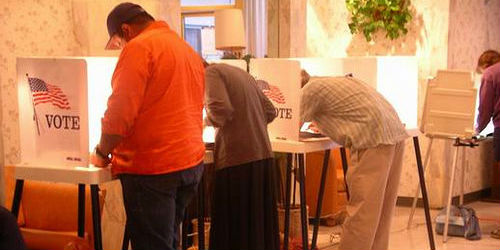What a difference an Election Day makes

What a diff’rence a day made, twenty-four little hours, brought the House and Senate new red seats, where there used to be blue…
Chances are that much of Washington has been humming the words to Dinah Washington’s Grammy Award-winning song since the November mid-term elections when the Republicans increased their majority in the House and seized control of the Senate.
Republicans gained 13 seats in the House and 9 seats in the Senate, and are now firmly in control of both Houses of Congress, 247 – 188 in the House and 54 – 44 in the Senate, with two independents who caucus with the Democrats. The election results bring more changes to Congress than just new members.
The chairs of several key standing House committees changed and Senate committee chairs switched from Democrats to Republicans. The makeup of committees and committee staff also changed, as the ratio of Republican to Democratic members and staff was adjusted to reflect Republican control. These changes—especially in committees with jurisdiction over tax and retirement matters—could have a direct impact on IRAs and employer-sponsored retirement plans.
In the House, Representative Paul Ryan (R-WI) is the new chair of the House Committee on Ways and Means, the oldest committee of the United States Congress, and the chief tax-writing committee in the House. Chairman Ryan, the Republican’s leading expert on budget matters, who previously served as chair of the House Budget Committee, takes over from former Chairman Dave Camp (R-MI). In early 2014, then Chairman Camp released a draft tax reform plan that would have made significant changes to tax-advantaged savings plans, including employer-sponsored retirement plans, Traditional and Roth IRAs, and Coverdell education savings accounts.
Because Representative Camp released the draft plan in a mid-term election year, few expected that action would occur on the plan, and instead that it could serve as the basis for future tax reform plans. Whatever direction Chairman Ryan takes on tax reform, the cost and effectiveness of current tax incentives for IRAs and qualified retirement plans is certain to be scrutinized.
Senator Mitch McConnell (R-KY) is the new Senate Majority Leader and Senator Orrin Hatch (R-UT) is the new chair of the Senate Finance Committee. As chairman, Senator Hatch will play a key role in tax reform and retirement security. In late 2014, he released a report compiled by his Senate Finance Committee staff that revealed the current state of our tax system and some possible direction on where reform efforts could be made in the near future. In releasing the report, Senator Hatch indicated that he has made tax reform his highest priority.
Senator Hatch also has taken an active role on retirement security issues. In the 113th Congress, he introduced the Secure Annuities for Employee (SAFE) Retirement Act that would have made changes to IRAs and employer-sponsored retirement plans. The bill included several IRA provisions, such as allowing IRA owners and qualified plan recipients to convert required minimum distributions to Roth IRAs and retain the amounts in the account, and permitting “incidental” life insurance contracts to be rolled over to IRAs. Senator Hatch also co-sponsored legislation with Senator Marco Rubio (R-FL) that would have allowed both spouses’ catch-up contributions to be made to a single health savings account (HSA) and allowed rollovers to HSAs of certain residual balances in health flexible spending arrangements (FSAs) and health reimbursement arrangements (HRAs).
We now must wait and see whether Chairman Hatch introduces similar legislation in this session of Congress or focuses his attention on tax reform.
Republicans may now control Congress, but the Treasury and Department of Labor (DOL), the two federal agencies that have authority over tax and retirement issues, are controlled by the same political appointees and the actions taken by those agencies can greatly affect IRAs.
Regulations on exceptions to the additional tax on early IRA distributions and guidance on Traditional and Roth IRAs are in the Treasury Department’s 2014–2015 Priority Guidance Plan. Phyllis Borzi remains in place as Assistant Secretary of Labor of the Employee Benefits Security Administration (EBSA), which is likely to issue its long-delayed fiduciary proposal later this year. The EBSA proposal would redefine the term “fiduciary” for purposes of ERISA and IRAs, and could cause credit unions that serve as IRA trustees and custodians to be treated as fiduciaries under ERISA.
Even though leaders in both parties want to reform the tax code, and both Senator McConnell and President Obama have stated that trade and tax policy are areas of potential bipartisan cooperation, it remains to be seen if comprehensive tax reform is taken up this year. If it is, how will it affect IRAs and retirement savings plans? In the end—for IRAs and retirement plans—the difference an election day made may not be about the makeup of Congress, but the fact that President Obama’s political appointees at the Treasury and DOL remain in office, along with their authority to promulgate regulations.

